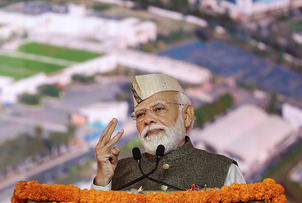Montenegro learns true cost of China-backed USD 1 bn road to nowhere

Podgorica, Jun 02 (AFP):
Two sleek new roads vanish into mountain tunnels high above a sleepy Montenegrin village, the unlikely endpoint of a billion-dollar project bankrolled by China that is threatening to derail the tiny country’s economy. The government has already burnt through $944 million in Chinese loans to complete the first stretch of road, just 41 kilometres (25 miles), making it among the world’s most expensive pieces of tarmac. Chinese workers have spent six years carving tunnels through solid rock and raising concrete pillars above gorges and canyons, but the road in effect goes nowhere. Almost 130 kilometres still needs to be built at a likely cost of at least one billion euros ($1.2 billion).
“The construction looks impressive, but we must not stop at this,” says 67-year-old Dragan who retired to the village of Matesevo. “It’s like buying an expensive car and just leaving it parked in the garage.”
Critics question how the rest of the road will be paid for and highlight environmental damage caused by the construction along with corruption allegations over the awarding of work contacts. But locals are inclined to talk up the positives.
“This story has some good sides for us villagers. Some managed to sell their land and leave, which was impossible before,” said one villager, whose two-storey home now sits metres from gargantuan concrete pillars propping up the four-lane highway.
“I manage to sell some vegetables and chickens to the workers,” added the man who did not want to be named, reflecting also that dirt mounds from the construction site stop the river from flooding.
The section linking Matesevo to a town near the capital Podgorica — the most difficult part to build — is set to open in November.
But the road is meant to connect the Adriatic port of Bar in the south with the Serbian border in the north, with the intention that the Serbians will then extend it to their capital, Belgrade.
It is unclear where the money will come from or how Montenegro — a country with a GDP of 4.9 billion euros — will repay its existing debt to China.
If Montenegro cannot pay, it faces arbitration in Beijing and could be forced to give up control of key infrastructure, according to a copy of the contract seen by AFP.
China has been widely criticised for saddling small countries with unmanageable debt as part of its global Belt and Road Initiative. Critics worry that it will use financial leverage to boost its political power, in what they dub “debt-trap diplomacy”.
But Chinese officials have strenuously denied any ulterior motive to the investment in Montenegro and the wider region. “This cooperation is mutually beneficial and win-win,” said China’s Montenegrin embassy in a statement last month.
“If someone puts negative labels on China’s investment, it is not only unfair to China, but also disrespectful to the countries of the western Balkans.”
With Montenegro’s first repayment due in July, it could become the first European country to put those claims to the test. “If we do not find sources of funding to build on, then we are in big trouble,” Infrastructure Minister Mladen Bojanic told AFP, saying he was committed to finishing the road. Bojanic is now trying to get help from the European Union to rescue a project he bitterly opposed when he was in opposition, labelling it risky and reckless.








